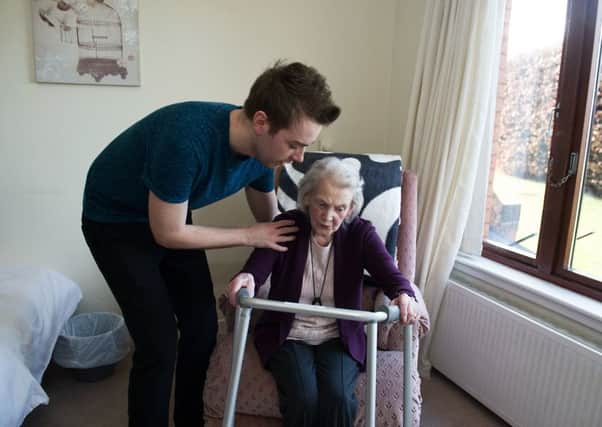Helen Martin: How austerity is changing our morals


The tighter the belt, the more drastic the cuts become. But at this point in history, the lack of public funding is even influencing and altering our morals, humanity and views on life and death, the most obvious example being care of the elderly.
Government and local authorities began this downward slope with the misguided policy that even vulnerable elderly people living alone should be supported to stay in their own homes as long as possible.
Advertisement
Hide AdAdvertisement
Hide AdThe truth is that visits by home care workers was a cheaper option than funding residential care. And the budgets were so strained that a large proportion of care visits were too short, too limited, insufficient and in many cases, resulted in loneliness and neglect.
That policy, over several years, has led to a situation where an increasing number of elderly who do eventually move into residential care are not just frail, with ongoing illnesses or limited mobility. The main factor that finally makes a care home a necessity is advancing dementia.
For care homes, that means a far higher ratio of staff to deal with residents who cannot dress themselves, eat, wash, go to the toilet or anything else without assistance and constant supervision. More nurses are required and much of the care assistant’s job today would have been part of the nursing role in the past. Many care homes are, in reality, nursing homes.
There’s another pricey element to that – the increasing paperwork the regulatory body demands of everyone from managers and nurses to carers, which takes up so much time that even more staff are needed to meet residents’ needs.
Advertisement
Hide AdAdvertisement
Hide AdDespite such higher running and staffing costs, the majority of care homes are independent businesses, which need a profit to continue. But with fees from government and councils failing to cover all these added pressures plus the living wage (which no-one can argue with), the inevitable is happening and care homes are being forced to shut, reducing the number of places available.
Meanwhile the jobs that visiting home carers used to do – cooking meals, a little cleaning up, local shopping, staying for a chat and a cup of tea, have changed to often no more than a five-minute visit to microwave a ready meal.
All that results in elderly “bed-blocking” in hospitals because no home-care package can be put in place for the patient to be discharged. And, as we all know, the increasing elderly population adds to the strain on our limited number of GPs with the NHS in a critical funding crisis.
The elderly aren’t the only budget victims. Now the Royal College of General Practitioners in Scotland is campaigning for people to not only see a pharmacist but seek advice online or buy over-the-counter medicines before they consider a GP appointment. A few decades ago doctors would be horrified and concerned if a patient took medical advice from anyone but them.
Advertisement
Hide AdAdvertisement
Hide AdAnd a survey by the BMJ has revealed 55 per cent of doctors are now in favour of assisted dying. That’s another major U-turn for the medical profession. Times change the way we do things. But sadly, lack of money, poor funding and strained budgets has the power to change our morals, ethics, beliefs and attitudes.
Council puts unrecyclable tags on recycling bins WHY would the council use weatherproof, unrecyclable plastic tags to tell residents their recycling bin has not been emptied because it’s “contaminated”? If it’s the green recycling bin they could leave a paper note inside, under the lid. If it’s the blue glass bin they could leave the message in a bottle. Adding to contamination doesn’t help.
A local legend who’ll be sadly missed ONE of my favourite local shops is Marchmont Hardware and I was so sorry to hear that owner, Stewart Munro, had died aged 68. He was a local legend supplying everything anyone needed.
He may have recognised me as a regular, but didn’t know my name. I once introduced myself over the phone when I rang to interview him about the effect out-of-town DIY stores had on local shops, and when a colleague turned up to take his photograph, he said: “Oh yes, that Helen Mirren called me a couple of days ago.”
Unfortunately, that was a slip of the tongue, not a visual comparison!
He’ll be sadly missed.